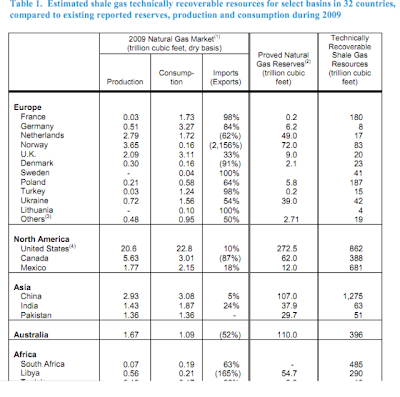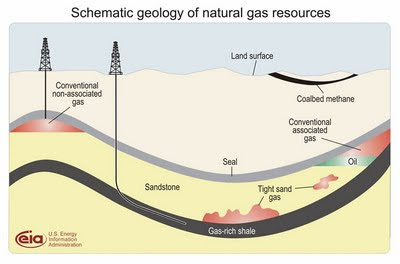PakAlumni Worldwide: The Global Social Network
The Global Social Network
Pakistan Can Overcome Energy Crisis with US Help on Shale Gas Development
Pakistan has over 50 trillion cubic feet of shale gas reserves, according to the US Energy Information Administration (EIA) estimates. It's enough to energize Pakistani homes, businesses, power plants, CNG vehicles, fertilizer plants and factories for 25 years at a rate of 2 trillion cubic feet of consumption per year at half the currently agreed price of imported gas from Iran, an agreement the US strongly opposes. It will also save Pakistanis hundreds of billions of dollars in foreign exchange.
The relevant question here is whether America is willing to offer through its oil and gas companies the necessary investment and the advanced technology to quickly and profitably develop shale gas fields in Pakistan in exchange for abandoning the Iran-Pakistan gas pipeline?
Shale gas revolution began a few years ago when an American named George P. Mitchell defied the skeptics and fought his opponents to extract natural gas from shale rock. The method he and his team used to release the trapped gas, called fracking, has paid off dramatically. In 2000, shale gas represented just 1 percent of American natural gas supplies. Today, it is over 30 percent and rising.
Up until 2009, the US was the largest importer of Qatari LNG. However, the discovery of development of shale gas has caused a glut in the US. The Qatari LNG imports are no longer needed and the gas prices have plummeted in the United States. Qatari oil minister was quoted by Bloomberg as saying that 60 percent of Qatari LNG exports “moved to the east” in 2009.
Increased production of gas from shale in the US has created a huge new supply, pushing down gas prices from $13/BTU (million British thermal units) four years ago to just $2/BTU today, even as the price of oil has more than doubled. By contrast, the Iran pipeline gas formula links the gas price to oil prices. It means that Pakistan will have to pay $12.30/BTU at oil price of $100/barrel, and a whopping $20/BTU for gas if oil returns to its 2008 peak of $150/barrel.
To encourage investment in developing domestic shale gas, Pakistan has approved a new exploration policy with improved incentives as compared with its 2009 policy, a petroleum ministry official said recently. Pakistan Petroleum is now inviting fresh bids to auction licenses to explore and develop several blocks in Dera Ismail Khan (KPK), Badin (Sind), Naushero Firoz (Sind) and Jungshahi (Sind), according to Oil Voice.
Under the new policy, exploration companies will be offered 40-50% higher prices for the extracted gas compared with the $4.26/Btu price announced in Exploration and Production Policy 2009. Companies which succeed in recovering gas from tight fields within two years will get 50% hike over the 2009 price and if it takes more time they will get only a 40% hike on the 2009 price. As an added incentive, the leases for the fields will now be for 40 years instead of 30 in the 2009 policy, the official said.
Even with the higher prices for the tight gas offered to the exploration companies, it is estimated that Pakistan will have to pay a maximum of $6.50/Btu for the gas compared with $12.30/Btu for gas imports, according to a report by Platts.
Pakistan should ask the Obama administration to help fund and develop shale gas in exchange for abandoning the Iran-Pakistan gas pipeline. It will be a historic win-win for both nations, as historic as the US aid to Pakistan for Green Revolution in 1960s. Pakistanis will get relief from the severe energy crisis which affects almost everyone in the country. The US energy companies will create thousands of American jobs and make a huge profit in the process with the potential bonus of largely neutralizing the strong anti-American sentiments in the country.
Related Links:
Abundant and Cheap Coal Electricity
US Dept of Energy Report on Shale Gas
Pakistan's Twin Energy Crises
Pakistan's Electricity Crisis
Pakistan's Gas Pipeline and Distribution Network
Pakistan's Energy Statistics
US Department of Energy Data
Electrification Rates By Country
CO2 Emissions, Birth, Death Rates By Country
China Signs Power Plant Deals in Pakistan
Pakistan Pursues Hydroelectric Projects
Pakistan Energy Industry Overview
Comparing US and Pakistani Tax Evasion
Pakistan's Oil and Gas Report 2010
Circular Electricity Debt Problem
International CNG Vehicles Association
Lessons From IPP Experience in Pakistan
Correlation Between Human Development and Energy Consumption
-
Comment by Riaz Haq on April 7, 2012 at 9:11am
-
Here's a PakTribune story on Russian offer to build Pak segment of Pak-Iran gas pipeline:
Amid severe sanctions on Iran by US and Western countries, Russia has come forward to bail out Pakistan to complete the much-touted Iran-Pakistan gas pipeline and has agreed to fully provide both technical and financial help.
Russia, which had earlier gifted to Pakistan the OGDCL and Pakistan Steel Mills, has now promised to help construct the IP gas line at a time when the consortium, headed by the Industrial and Commercial Bank of China (ICBC), has refused to provide financial advisory services for the gas pipeline project mainly because of US opposition to the project.
In the recent talks, held in Moscow, Russia has given a go ahead signal to Pakistan for completing the project under a government-to-government arrangement. The Russian company Gazprom will arrange finances and construct the pipeline, including the completion of engineering and design of the project.
However, the Russian company is seeking the setting aside of the Public Procurement Regulatory Authority (PPRA)ís rules to complete the mega project for which international bidding is a must as per the PPRA.
"The demands of Russia will be placed in the next ECC meeting, seeking the approval of the demands so that the projects construction could take place as soon as possible," said an official. However, the Ministry of Petroleum and Natural Resources will also seek the approval of the ECC in a cautious move for permission to allow arranging funds for the project from its own resources through infrastructure development.
In case the projectís commissioning gets later than the deadline of December 31, 2004, Pakistan will have to pay $1 million every day to Iran as penalty. "Once the engineering, procurement and construction (EPC) contract is given to the Russian company by putting aside the rules of PPRA, the Russian company will start completing the pipeline of 800km inside Pakistan," the official said.
http://paktribune.com/news/Russia-to-help-Pakistan-build-IP-gas-pip...
-
Comment by Riaz Haq on February 27, 2013 at 10:45pm
-
Here's a PakObserver report on possible US energy assistance for Pakistan:
With Pakistan fast heading to sign transnational pipeline project with Iran, US is most likely to offer a comprehensive but conditional energy assistance package as alternate to the Iranian gas.
According to diplomatic sources, the Obama Administration was contemplating to use a luring carrot this time to make Pakistan deliver in the so-called endgame in Afghanistan, besides refraining from translational gas pipeline from Iran.
Since the American strategists were working on a long-term plan to keep an influence centre in Afghanistan even after announced withdrawal of US/Nato troops from the war-torn country, they need Pakistan as a strategic partner even beyond war on terror. “That is why you hear a lot of talk back in Washington about focussing on Pakistan as a long-term partner rather than just a war ally or a facilitator of the endgame,” the sources pointed out.
The sources were of the view juxtaposition of anti-Iran and anti-drones sentiments in the American society may benefit this time in terms of a comprehensive American energy assistance package. “But this time the governments in Pakistan would have to deliver, if they really need their energy woes to be done away with,” the sources added. Consistent voices against the drones from within and outside Pakistan have perhaps made US Administration to understand that drones were practically appearing to be counter productive to the war on terror entering the decisive phase now, they underlined.
Other than strategic and political conditionality attached to prospective energy assistance package, the government in Pakistan would have to expand tax net, end blindfold government borrowing, and culture of vague subsidies.
When asked to comment on possibilities of a new US energy assistance package, US Embassy spokesperson Rian Harris said such proposals and details are not known at the embassy level in advance.
Asked what US law bars Pakistan or any other nation to indulge in business with Iran as India was also buying oil from the same country, she said, “US policy on Iran has not changed.”
“U.S. policy on Iran is well known. We have made it clear to all our interlocutors around the world that it is in their interests to avoid activities that may be prohibited by UN sanctions or sanctionable under U.S. law,” she went on.
“We recognise that Pakistan has significant energy requirements and US are committed to helping alleviate shortfalls,” Rain adds
She reminded, that is why we have invested in major energy infrastructure projects, such as renovating the Tarbela and Mangla dams, modernising the thermal power plants in Guddu, Jamshoro and Muzaffargarh, and building the Satpara and Gomal Zam dams.
These efforts have already added more than 400 megawatts of power to the national grid, and will add a total of 950MW — enough power for 2 million households — by the end of this year,” she said.
Asked how India was exempted from sanctions and buying oil from Iran, she said, “the National Defence Authorisation Act provides the ability to grant exceptions of 180 days to those countries that demonstrate they are significantly reducing their volumes of crude oil imports from Iran.
In December the Secretary of State granted exemptions to nine economies that demonstrated significant reductions of crude oil imports, including India.
Economies must take continuous steps to earn a renewal of the exemption for another 180 days through continued reductions in their purchases,” she concluded.
Comment
Twitter Feed
Live Traffic Feed
Sponsored Links
South Asia Investor Review
Investor Information Blog
Haq's Musings
Riaz Haq's Current Affairs Blog
Please Bookmark This Page!
Blog Posts
Modi's AI Spectacle: Chaos and Deception in New Delhi
The India AI Impact Summit 2026, held at Bharat Mandapam in New Delhi, has been marred by chaos, confusion and deception. The events on the ground have produced unintended media headlines for India's Prime Minister Narendra Modi who wants to be seen as the "vishwaguru" (teacher of the world) in the field of artificial intelligence as well. First, there was massive chaos on the opening day, with long…
ContinuePosted by Riaz Haq on February 19, 2026 at 12:00pm — 11 Comments
India-Pakistan Cricket Match: The Biggest Single Event in the World of Sports
Why did Pakistan's decision to boycott the India-Pakistan match in solidarity with Bangladesh in this year's T20 World Cup send shockwaves around the world? And why did it trigger the International Cricket Council's and other cricket boards' urgent efforts to persuade Pakistan to return to the match? The reason has a lot to do with its massive financial impact, estimated to be as much as …
ContinuePosted by Riaz Haq on February 11, 2026 at 4:00pm — 2 Comments
© 2026 Created by Riaz Haq.
Powered by
![]()




You need to be a member of PakAlumni Worldwide: The Global Social Network to add comments!
Join PakAlumni Worldwide: The Global Social Network